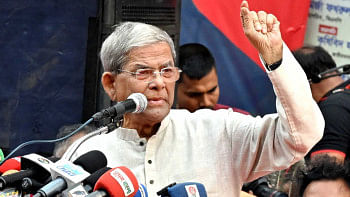A platform of trust

When I hear hardened words from trade union leaders, instead of critiquing, I try and reason, and pose a critical question to myself and most of my more self-aware colleagues: Do they sound the way they sound because of their years of dissatisfaction or disappointment? Perhaps.
Second question: Have we, the manufacturers, contributed to their dissatisfaction? Perhaps.
Final question: And now…have times changed? Yes, they have.
Post-Rana Plaza shaming put all the manufacturers in Bangladesh in a remediation mode. At the business level, brands and unions together, through forming Accord, set clear rules for factories to be remediated, and so we listened. At the national level, after revision of minimum wage, labour law and an altered trade scene, exports still managed to grow. At an international level, Bangladesh made the headlines on a routine basis.
Post-Special Paragraph ILO phase put the manufacturers on their toes again. Bangladesh, in International Labour Conference (ILC) in June 2016, received a warning from ILO specifying four observations relating to changes to Bangladesh Labour Act (BLA) 2013 and the draft EPZ policy, dipping numbers of trade union registration and workers' harassment. As luck would have it, Ashulia unrest happened in December 2016 and fears escalated within the European Union (EU) and others that the labour scene in Bangladesh continued to be unchanged. Therefore, based on the Special Paragraph, the EU took the position of warning the stakeholders that with another issuance of Special Paragraph in June 2017, ILC and the EU would put in place a special monitoring process on the Everything But Arms advantage granted to Bangladesh, which allows us to export our goods without any duties to Europe. To this, we reacted and set our hearts to change the scene. BGMEA invested in deep discussions with the EU, the rest of the Compact partners, and the government and finally negotiated the following:
- Recall of the EPZ draft back from the Parliament with a view to amend;
- Continued to stress to the government to amend BLA 2013 to comply with ILO obligations;
- Addressed Ashulia unrest through a tripartite agreement being signed between BGMEA, Ministry of Labour and the trade unions indicating that unsubstantiated cases would be closed and rest pursued as per national law. Moreover, a Tripartite Consultative Committee on readymade garment sector was formed by the government with a view to address labour disputes and any other concerns;
- Put in place Standard Operating Procedures and shared that the number of trade unions continued to grow in 2017.
All parties concerned acknowledged their obligations and after a successful signing of a joint declaration with Compact Partners, actively backed by the Hon'ble Commerce Minister and the successful deliberation by our Hon'ble Law Minister during the ILC, ILC refrained from issuing Special Paragraph and demanded updates by November. With active support of all parties, manufacturers thought that they were entering better times.
But then came the announcement of Accord's extension beyond 2018. Let's be honest. This was not news to any of us as it is natural to assume that Bangladesh would need to continue with its structural, fire and electrical safety checks and updates. But to most of us, the launch of Accord version 2 on June 29, almost a year earlier than its tenure expiration, without the inclusion or reference of any local stakeholder was surprising. Moreover, the document has two major changes: Accord version 2, unlike its first version, is not solely based on "building on" National Action Plan and it has extended its agenda to "freedom of association".
As a member of the manufacturing community, I urge all parties to consider the following:
- Inclusion of the local stakeholders and the government in the final document of Accord and to kindly treat the launch of the second version of Accord as launch of a proposed document;
- Consider that Bangladeshi manufacturers need to prepare themselves to implement self-monitoring and assessment. Therefore, the target should be to help the sector to focus on capacity building and involve Remediation Coordination Cell (RCC) to take the initiative forward;
- Consider that all countries have negative stories on labour rights and that perhaps, all of them need to have international interventions (in the form of Accord) in there as well, since we have borne the pressure, succeeded and have set an example?
As a member of the manufacturing community, I also urge all parties to kindly consider that Bangladesh has done way better than most of the other countries manufacturing and exporting garments. With no offence meant to anyone, let me draw your attention to countries which have been in discussion for the last six months, on account of labour rights violations.
Cambodia has faced criticism for three garment workers' death in Phnom Penh's Veng Sreng Boulevard three years ago, along with hundreds of strikes, petitions to PM's cabinet over unpaid wages, anger at scrapping maternity benefits involving breastfeeding hours, mass fainting in Sihanoukville garment factory, workers seeking government intervention with regard to compensation and unlawful termination of trade union leaders, footwear factory workers' protest, police excesses on May Day and the final one being minimum wage talks (to begin in July) which have already been stated as an agreement which reportedly "guts" basic freedom. Yet garment exports from Cambodia have surged to EU in the last 10 years, as they have become the fifth largest exporter to EU from being the tenth largest while growing by 14 percent in 2016 to reach USD 3.8 billion, putting it ahead of Vietnam and is now all set to surpass India.
Myanmar has had more than 50 stories on strikes over unpaid wages, unfair dismissals, garment workers being terminated because of attempted unionisation and there have even been reports of more than 1.3 million child labourers.
News of Indian workers dying of asphyxia in Hisar shoe factory fire, powerloom workers' strikes, Tamil Nadu spinning mills being accused of modern day slavery, Bengaluru factory being accused of sexual harassment, hundreds of child workers being rescued from leather units in Hyderabad, women shoemakers earning just over USD 40 per month, etc., compel us to pause and reflect.
In Pakistan, Khaadi, one of the largest brands in the country's apparel industry, is at the centre of a campaign against ill treatment of workers, and the company's alleged layoff of 32 workers ahead of Ramadan has caused quite a stir. We also wonder why the families of those affected by the 2012 Baldia Town factory fires that killed 257 workers are yet to be compensated after four years.
The recent stories on Sri Lanka hosting sweatshops with workers getting paid for 54 cents an hour to produce Beyonce's clothing line, workers protesting against foreign-owned "sweatshops" in Haiti, Vietnamese footwear workers striking for better conditions, etc., have all been read over the last six months.
Last but not the least, even Europe faces exploitation accusations. A study showed Romanian workers' monthly take-home being only 178 euro after taxes, which with overtime, could go up to 222 euro. On top of that, the tale of thousands of Syrian refugees working long hours in unhealthy conditions in Turkey continued to be a focal point for many of us for days after it was reported.
But even more damning is Bangladesh popping up in every survey as topping the worst possible index. We are ranked as one of the ten worst offenders in labour rights. We are being put in the same league as countries which disallow freedom of association to migrant workers, with countries like Egypt, where trade unionists continue to suffer severe discrimination, detention (Alexandria Shipyard case) and state repression; the Philippines, where union leaders are particularly at risk of violence, intimidation and murder (two leaders murdered within the space of one week in September 2016); Colombia, which, even after initiation of peace process, remains one of the worst violators of trade union rights with a horrendous record for impunity regarding the murders of trade unionists; Kazakhstan, where trade unions are facing an orchestrated state policy to weaken solidarity, which includes arrest of leaders; Turkey, where trade unions and their members have been made public enemies and where over 100,000 public sector workers have lost their jobs in systematic purges by the government; and Guatemala, where the country retains its notorious reputation for violence against workers, intimidation, kidnapping and death threats, which severely undermine freedom.
With all that listed, my humble submission to all parties is to simply consider one approach of collaboration. We are proud Bangladeshis, who believe in freedom, readily admit failures and learn lessons from past mistakes. If there's a trust deficit within our circle, let's bridge it with respect; if there's a disconnect in communications and coordination, let's address it today; if there's doubt, then let's discuss it out in the open and not spring unexpected surprises along the route.
While manufacturers in Bangladesh continue to be astonished by the sudden "launch" of Accord version 2, we also deeply appreciate what Accord has done to the industry in helping us remediate and get better. If we are to improve our mark, the journey cannot be undertaken by only the brands and the unions alone. We, the local stakeholders, must have a part to play. After all, all of us want to be a part of a happier and successful narrative. Exclusion of any party will only cause hurt and distance. And frankly, today, we need to work together closer than ever, for the sake of the four million workers who toil. We simply cannot afford to let them go hungry.
The writer is Managing Director, Mohammadi Group.

 For all latest news, follow The Daily Star's Google News channel.
For all latest news, follow The Daily Star's Google News channel. 



Comments